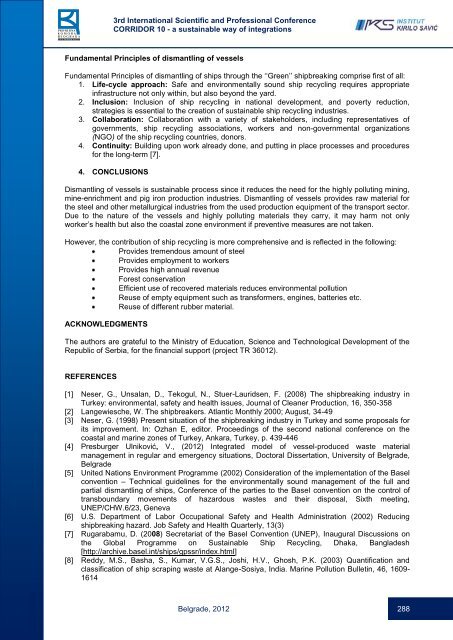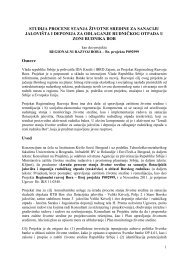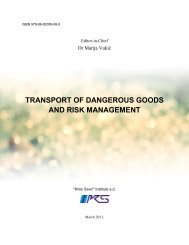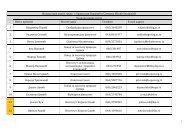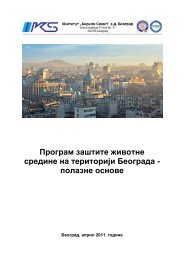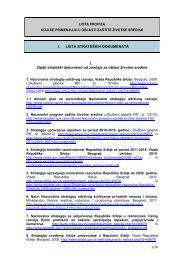Zbornik radova Koridor 10 - Kirilo SaviÄ
Zbornik radova Koridor 10 - Kirilo SaviÄ
Zbornik radova Koridor 10 - Kirilo SaviÄ
Create successful ePaper yourself
Turn your PDF publications into a flip-book with our unique Google optimized e-Paper software.
3rd International Scientific and Professional Conference<br />
CORRIDOR <strong>10</strong> - a sustainable way of integrations<br />
Fundamental Principles of dismantling of vessels<br />
Fundamental Principles of dismantling of ships through the ‘‘Green’’ shipbreaking comprise first of all:<br />
1. Life-cycle approach: Safe and environmentally sound ship recycling requires appropriate<br />
infrastructure not only within, but also beyond the yard.<br />
2. Inclusion: Inclusion of ship recycling in national development, and poverty reduction,<br />
strategies is essential to the creation of sustainable ship recycling industries.<br />
3. Collaboration: Collaboration with a variety of stakeholders, including representatives of<br />
governments, ship recycling associations, workers and non-governmental organizations<br />
(NGO) of the ship recycling countries, donors.<br />
4. Continuity: Building upon work already done, and putting in place processes and procedures<br />
for the long-term [7].<br />
4. CONCLUSIONS<br />
Dismantling of vessels is sustainable process since it reduces the need for the highly polluting mining,<br />
mine-enrichment and pig iron production industries. Dismantling of vessels provides raw material for<br />
the steel and other metallurgical industries from the used production equipment of the transport sector.<br />
Due to the nature of the vessels and highly polluting materials they carry, it may harm not only<br />
worker’s health but also the coastal zone environment if preventive measures are not taken.<br />
However, the contribution of ship recycling is more comprehensive and is reflected in the following:<br />
Provides tremendous amount of steel<br />
Provides employment to workers<br />
Provides high annual revenue<br />
Forest conservation<br />
Efficient use of recovered materials reduces environmental pollution<br />
Reuse of empty equipment such as transformers, engines, batteries etc.<br />
Reuse of different rubber material.<br />
ACKNOWLEDGMENTS<br />
The authors are grateful to the Ministry of Education, Science and Technological Development of the<br />
Republic of Serbia, for the financial support (project TR 36012).<br />
REFERENCES<br />
[1] Neser, G., Unsalan, D., Tekogul, N., Stuer-Lauridsen, F. (2008) The shipbreaking industry in<br />
Turkey: environmental, safety and health issues, Journal of Cleaner Production, 16, 350-358<br />
[2] Langewiesche, W. The shipbreakers. Atlantic Monthly 2000; August, 34-49<br />
[3] Neser, G. (1998) Present situation of the shipbreaking industry in Turkey and some proposals for<br />
its improvement. In: Ozhan E, editor. Proceedings of the second national conference on the<br />
coastal and marine zones of Turkey, Ankara, Turkey, p. 439-446<br />
[4] Presburger Ulniković, V., (2012) Integrated model of vessel-produced waste material<br />
management in regular and emergency situations, Doctoral Dissertation, University of Belgrade,<br />
Belgrade<br />
[5] United Nations Environment Programme (2002) Consideration of the implementation of the Basel<br />
convention – Technical guidelines for the environmentally sound management of the full and<br />
partial dismantling of ships, Conference of the parties to the Basel convention on the control of<br />
transboundary movements of hazardous wastes and their disposal, Sixth meeting,<br />
UNEP/CHW.6/23, Geneva<br />
[6] U.S. Department of Labor Occupational Safety and Health Administration (2002) Reducing<br />
shipbreaking hazard. Job Safety and Health Quarterly, 13(3)<br />
[7] Rugarabamu, D. (2008) Secretariat of the Basel Convention (UNEP), Inaugural Discussions on<br />
the Global Programme on Sustainable Ship Recycling, Dhaka, Bangladesh<br />
[http://archive.basel.int/ships/gpssr/index.html]<br />
[8] Reddy, M.S., Basha, S., Kumar, V.G.S., Joshi, H.V., Ghosh, P.K. (2003) Quantification and<br />
classification of ship scraping waste at Alange-Sosiya, India. Marine Pollution Bulletin, 46, 1609-<br />
1614<br />
Belgrade, 2012 288


